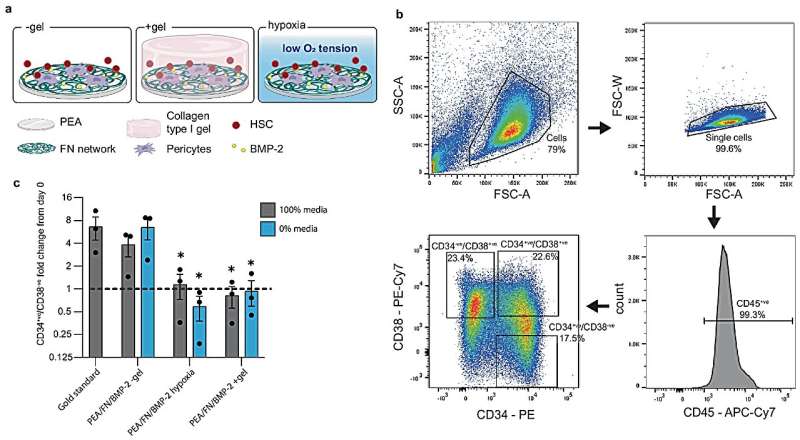Scientists have created the first bioengineered bone marrow model that can support the type of human stem cells that are crucial for bone marrow transplants and in vitro study work.
The research—published in Nature Communications and led by the University of Glasgow—replicates key aspects of the human bone marrow microenvironment, to enable the support of rare long-term hematopoietic stem cells, or LT-HSCs.
LT-HSCs are vital for bone marrow transplants as they are the cell type that can replenish the blood cells after treatment for blood cancers. However, they are challenging to culture in the lab as they quickly change or die once out of the body. This means that we rely on non-human, animal, models to test drugs that can have effects on blood cell production and in targeting blood diseases (such as leukemias).
This study, where LT-HSCs were cultured out of the body, in jelly-like gels, shows, for the first time, that culturing the cells out of the body is possible.
The scientists demonstrate that gene editing of LT-HSCs in the gels is possible and believe the findings could provide a new way to test new drugs or techniques for treating blood disorders, such as sickle cell disease, and blood cancers, reducing the reliance on animal models, which are increasingly poor predictors of drug outcomes.
The work is part of a major investment last year into leukemia research in the U.K. to engineer novel technologies and research tools to focus on understanding and predicting leukemia and developing drugs for improved health care.

Leukemia is a disease that kills more than 300,000 people in the world every year. However, there remain challenges to early diagnosis, which in turn reduce the impact of treatments. While leukemia is much more common in older people, there is now evidence that cells in our body develop changes that can lead to leukemia or other cancers many years before they can be identified with current diagnostic techniques.
Dr. Hannah Donnelly, the research fellow who led the study at the University of Glasgow said, “LT-HSCs are notoriously difficult to culture outside the body yet hold enormous clinical value. Here, we show that by using gels engineered to mimic the environment where they reside in the bone marrow, we can support and study these cells in the lab, ultimately harnessing their full clinical potential.”
Matt Dalby, Professor of Cell Engineering, and Director of Innovation, Engagement and Enterprise at the School of Molecular Biosciences at the University of Glasgow, said, “Our new research is incredibly exciting and is big news for the ability to effectively test new drugs. Currently used animal models are poor predictors of drug outcomes, and many of the blood disease treatments on offer—such as mRNA drugs and human-specific small molecules—don’t test well in animal models.
“By creating ambitious models of the bone marrow—which contain human cells and have the ability to mimic blood cell growth—we are thrilled to show for the first time that it is possible to test true human blood cells out with the human body, and the implications for accelerating therapies for diseases such as sickle cell disease and blood cancers gives us huge reason to be hopeful.”
Professor Manuel Salmeron Sanchez, Chair of Biomedical Engineering and Head of the School of Engineering at the University of Glasgow, added, “This work is tremendously exciting. Currently, a major problem is that we rely on non-human rodent models to understand disease progression and to identify new treatments.
“By developing a new model such as we have done in this study, which mimics the bone marrow, and by using human cells within these models, we can focus on these earliest stages of diseases to provide new understanding, new screening methods and new drugs.”
More information:
Hannah Donnelly et al, Bioengineered niches that recreate physiological extracellular matrix organisation to support long-term haematopoietic stem cells, Nature Communications (2024). DOI: 10.1038/s41467-024-50054-0
Citation:
Scientists develop first bone marrow model that supports human stem cells (2024, July 17)
retrieved 17 July 2024
from https://medicalxpress.com/news/2024-07-scientists-bone-marrow-human-stem.html
This document is subject to copyright. Apart from any fair dealing for the purpose of private study or research, no
part may be reproduced without the written permission. The content is provided for information purposes only.

